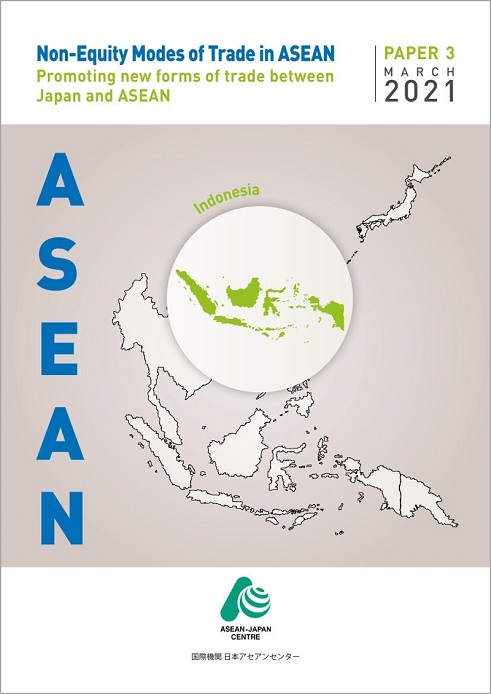|
|
|
|
November 16, 2024 -Saturday |
|
|
|
 |
|
|
|
|
NON-EQUITY MODES OF TRADE BETWEEN INDONESIA AND JAPAN SEEN TO OFFER OPPORTUNITIES TO JOIN INTERNATIONAL NETWORKS OF PRODUCTION ACCORDING TO THE STUDY BY ASEAN-JAPAN CENTRE
Tuesday 01/06/2021

“Non-Equity Modes of Trade in ASEAN” on Indonesia is available for download on AJC website (Graphic: Business Wire)
TOKYO, June 1 (Bernama-BUSINESS WIRE) -- ASEAN-Japan Centre (AJC) issued the 7th paper of the “Non-Equity Modes of Trade in ASEAN: Promoting new forms of trade between Japan and ASEAN” series focusing on Indonesia in March 2021. The findings of the paper were presented in the “Webinar on Non-Equity Modes of Indonesia” by AJC held on May 27, 2021. According to the paper, non-equity modes (NEMs) of trade in Indonesia is foreseen to potentially play a role in expanding opportunities to participate in global value chains and are critical for inclusive economic development especially in the COVID-19 pandemic.
This press release features multimedia. View the full release here:
https://www.businesswire.com/news/home/20210601005358/en/
Indonesia is the seventh largest economy in the world, and one-third of its economy is contributed by investments. NEMs in Indonesia exists in natural rubber industries in the form of contract farming, in footwear industry through outsourcing and subcontracting, in fast-food and convenience stores through franchising, and in international hotel chains through management contracts or licensing agreements. The recent passage of Law number 11 of 2020 on Job Creation aims to ease the main obstacles to investing in Indonesia, and benefits also NEMs by attracting investors to Indonesia with the expected ease of doing business in the country.
NEMs present opportunities that are not found in foreign direct investment (FDI). For example, it is an attractive choice for international brand owners and transnational corporations (TNCs) considering their flexibility to enter the Indonesian market through contractual agreements with local companies. To meet the standards of TNCs, local companies are expected to be equipped with management and technological skills and capacity. However, as transnational corporations can easily terminate contracts, a long-term relationship is not guaranteed particularly when the quality of goods and services does not meet the TNC’s standards. While FDI may have a better advantage than NEM in terms of bringing in capital, NEM expands the operational methods to have local Indonesian firms engaged in international networks of production.
The existence of NEMs provides incentives for local companies to grow their businesses. If local firms can maximize know-how and technological skills by linking with TNCs, they can build their own capacities based on these incentives and even expand their businesses by using the TNC’s networks. To fully maximize the potentials of NEMs, the paper recommends that the Indonesian government consider: (1) enhancing capability of small and medium enterprises through entrepreneurial development and incubation programs and microfinancing programs; (2) implementing and strengthening the regulatory working environment to expand employment, upgrade technology and contribute to global value chains; (3) support the promotion and upgrading of skills and expertise of its local workforce through new education programs such as Kampus Merdeka, and through the Pre-Employment Card; and (4) develop science, technology and innovation infrastructure to enable companies to build more efficient business practices.
The Regional Comprehensive Economic Partnership (RCEP) concluded in late 2020 further expands the market to a wider East Asia. The Indonesian government’s efforts to maximize such opportunities can enable NEMs to better integrate ASEAN economies. Reduced bureaucracy and deregulation will increase the competitiveness of Indonesian companies and help them access global markets. Further, facilitative investment policies and a more flexible labour market are indispensable strategies to improve Indonesian competitiveness in the future.
The findings of the paper were presented in the Webinar on Non-Equity Modes of Indonesia held on May 27 2021. AJC invited paper discussants from the government and academe, including Dr. Kasan Muhri, Head of Trade Analysis and Development Agency, Directorate General of Trade Policy Analysis and Development, Ministry of Trade, Republic of Indonesia, Professor Chie Iguchi from Keio University, and AJC Secretary General Masataka Fujita. For the full report on the webinar, please see https://www.asean.or.jp/en/trade-info/20210601/.
“Non-Equity Modes of Trade in ASEAN: Promoting new forms of trade between Japan and ASEAN: Paper 3 Indonesia” is available for download on AJC’s website as below.
https://www.asean.or.jp/ja/wp-content/uploads/sites/2/NEM-Indonesia-Paper-3-full-web.pdf
View source version on businesswire.com:
https://www.businesswire.com/news/home/20210601005358/en/
Contact
ASEAN-Japan Centre (AJC) PR Unit
Tomoko Miyauchi (MS)
URL: https://www.asean.or.jp/en/
E-mail: toiawase_ga@asean.or.jp
Source : ASEAN-Japan Centre (AJC)
--BERNAMA
|
|
|
|
|
|